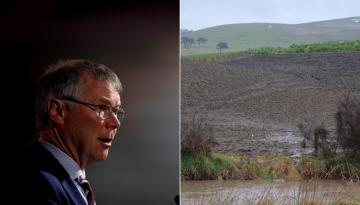As controversy continues to surround new freshwater rules introduced earlier this month, a group of farmers in the North Island is taking a community approach to cleaning up their patch of the environment.
The Rangitikei Rivers Catchment Collective (RRCC) manages a number of subcatchments covering the Rangitikei, Turakina and Whangaehu River catchments and aims to promote good on-farm practice and sustainable land management principles.
Bulls farmer and chair of the collective Roger Dalrymple says the new freshwater regulations bring "some challenging stuff" for those in the agriculture sector, but he is hoping movements like the RRCC will go some way to "providing support for the farmers being challenged by these freshwater policies".
Farmers have been vocal in their opposition to parts of the new freshwater regulations, which are aimed at regulating activities that pose risks to the health of freshwater and freshwater ecosystems.
Many, like industry lobbying group Federated Farmers, say while they agree with the goal of the legislation, much of it is impractical and "entirely unworkable".
Last week farmers in Southland threatened to boycott some of the rules around winter grazing in a bid to send a strong message to the Government. That was met with a stark warning from Environment Minister David Parker, who told them "no one is above the law".
On Wednesday, however, Agriculture Minister Damien O'Connor said the Government had made a number of adjustments to the rules and hinted that more changes could be on the way.
Dalrymple said it could be difficult for farmers to meet some of the rules as they stood without it having a negative impact on their business.
"Community catchments allow us to support farmers through that, but better still it allows us to get tools in our toolbox for planning ahead, supporting farmers and educating farmers as to how we can make these improvements over a greater-length period of time," Dalrymple told Dominic George on Magic Talk's Rural Today on Wednesday.
"No one wants to pollute the environment, no farmers want to pollute their waterways."
He says since it was established in 2017, the RRCC has had overwhelming support from locals.
"Getting the farmers on board wasn't really very hard," he says.
"Farmers love it because they want to know how their own patch of dirt is affecting the water in their catchment."
Dalrymple says there is a rivalry among those taking part to have the best results.
"It's a great competition...it puts farmers against farmers, saying 'if they're as good as that, how can we get to that level?' It's fantastic, the interest shown from farmers, and it's not just our area, I know it's the same in other areas."
Although the group has been busy doing "intense and detailed" testing of water quality in the area, Dalrymple says it will be a while yet until they can see concrete results.
"Water testing is a bit like soil testing - if you go and take a water test or a soil test it just tells you one thing in that moment, but it can be affected by such a lot of variables. So it's a trend we're picking up and it won't be for three years until we have a good understanding of the effect we're having."
He says so far they've had "some good results", "some very good results" and "some bad results" as well.
"But that's only one test...until we've been testing for a while and got that trend it's not actually going to mean a lot."
In the meantime, though, Dalrymple says the project is "all positive stuff" and is "bringing a lot of passion into the room".


